- Home
- Emile Gaboriau
L'affaire Lerouge. English Page 2
L'affaire Lerouge. English Read online
Page 2
CHAPTER II.
The two last depositions awakened in M. Daburon's mind some slightgleams of hope. In the midst of darkness, the humblest rush-lightacquires brilliancy.
"I will go at once to Bougival, sir, if you approve of this step,"suggested Gevrol.
"Perhaps you would do well to wait a little," answered M. Daburon. "Thisman was seen on Sunday morning; we will inquire into Widow Lerouge'smovements on that day."
Three neighbours were called. They all declared that the widow hadkept her bed all Sunday. To one woman who, hearing she was unwell,had visited her, she said, "Ah! I had last night a terrible accident."Nobody at the time attached any significance to these words.
"The man with the rings in his ears becomes more and important," saidthe magistrate, when the woman had retired. "To find him again isindispensable: you must see to this, M. Gevrol."
"Before eight days, I shall have him," replied the chief of detectivepolice, "if I have to search every boat on the Seine, from its sourceto the ocean. I know the name of the captain, Gervais. The navigationoffice will tell me something."
He was interrupted by Lecoq, who rushed into the house breathless. "Hereis old Tabaret," he said. "I met him just as he was going out. What aman! He wouldn't wait for the train, but gave I don't know how much to acabman; and we drove here in fifty minutes!"
Almost immediately, a man appeared at the door, whose aspect it must beadmitted was not at all what one would have expected of a person who hadjoined the police for honour alone. He was certainly sixty years old anddid not look a bit younger. Short, thin, and rather bent, he leanton the carved ivory handle of a stout cane. His round face wore thatexpression of perpetual astonishment, mingled with uneasiness, whichhas made the fortunes of two comic actors of the Palais-Royal theatre.Scrupulously shaved, he presented a very short chin, large and goodnatured lips, and a nose disagreeably elevated, like the broad end ofone of Sax's horns. His eyes of a dull gray, were small and red at thelids, and absolutely void of expression; yet they fatigued the observerby their insupportable restlessness. A few straight hairs shaded hisforehead, which receded like that of a greyhound, and through theirscantiness barely concealed his long ugly ears. He was very comfortablydressed, clean as a new franc piece, displaying linen of dazzlingwhiteness, and wearing silk gloves and leather gaiters. A long andmassive gold chain, very vulgar-looking, was twisted thrice round hisneck, and fell in cascades into the pocket of his waistcoat.
M. Tabaret, surnamed Tirauclair, stood at the threshold, and bowedalmost to the ground, bending his old back into an arch, and in thehumblest of voices asked, "The investigating magistrate has deigned tosend for me?"
"Yes!" replied M. Daburon, adding under his breath; "and if you are aman of any ability, there is at least nothing to indicate it in yourappearance."
"I am here," continued the old fellow, "completely at the service ofjustice."
"I wish to know," said M. Daburon, "whether you can discover some cluethat will put us upon the track of the assassin. I will explain the--"
"Oh, I know enough of it!" interrupted old Tabaret. "Lecoq has told methe principal facts, just as much as I desire to know."
"Nevertheless--" commenced the commissary of police.
"If you will permit me, I prefer to proceed without receiving anydetails, in order to be more fully master of my own impressions. Whenone knows another's opinion it can't help influencing one's judgment.I will, if you please, at once commence my researches, with Lecoq'sassistance."
As the old fellow spoke, his little gray eyes dilated, and becamebrilliant as carbuncles. His face reflected an internal satisfaction;even his wrinkles seemed to laugh. His figure became erect, and his stepwas almost elastic, as he darted into the inner chamber.
He remained there about half an hour; then came out running, thenre-entered and then again came out; once more he disappeared andreappeared again almost immediately. The magistrate could not helpcomparing him to a pointer on the scent, his turned-up nose even movedabout as if to discover some subtle odour left by the assassin. Allthe while he talked loudly and with much gesticulation, apostrophisinghimself, scolding himself, uttering little cries of triumph orself-encouragement. He did not allow Lecoq to have a moment's rest. Hewanted this or that or the other thing. He demanded paper and a pencil.Then he wanted a spade; and finally he cried out for plaster of Paris,some water and a bottle of oil.
When more than an hour had elapsed, the investigating magistrate beganto grow impatient, and asked what had become of the amateur detective.
"He is on the road," replied the corporal, "lying flat in the mud, andmixing some plaster in a plate. He says he has nearly finished, and thathe is coming back presently."
He did in fact return almost instantly, joyous, triumphant, looking atleast twenty years younger. Lecoq followed him, carrying with the utmostprecaution a large basket.
"I have solved the riddle!" said Tabaret to the magistrate. "It is allclear now, and as plain as noon-day. Lecoq, my lad, put the basket onthe table."
Gevrol at this moment returned from his expedition equally delighted.
"I am on the track of the man with the earrings," said he; "the boatwent down the river. I have obtained an exact description of the masterGervais."
"What have you discovered, M. Tabaret!" asked the magistrate.
The old fellow carefully emptied upon the table the contents of thebasket,--a big lump of clay, several large sheets of paper, and threeor four small lumps of plaster yet damp. Standing behind this table, hepresented a grotesque resemblance to those mountebank conjurers who inthe public squares juggle the money of the lookers-on. His clothes hadgreatly suffered; he was covered with mud up to the chin.
"In the first place," said he, at last, in a tone of affected modesty,"robbery has had nothing to do with the crime that occupies ourattention."
"Oh! of course not!" muttered Gevrol.
"I shall prove it," continued old Tabaret, "by the evidence. By-and-byI shall offer my humble opinion as to the real motive. In the secondplace, the assassin arrived here before half-past nine; that is tosay, before the rain fell. No more than M. Gevrol have I been able todiscover traces of muddy footsteps; but under the table, on the spotwhere his feet rested, I find dust. We are thus assured of the hour.The widow did not in the least expect her visitor. She had commencedundressing, and was winding up her cuckoo clock when he knocked."
"These are absolute details!" cried the commissary.
"But easily established," replied the amateur. "You see this cuckooclock above the secretary; it is one of those which run fourteen orfifteen hours at most, for I have examined it. Now it is more thanprobable, it is certain, that the widow wound it up every evening beforegoing to bed. How, then, is it that the clock has stopped at five?Because she must have touched it. As she was drawing the chain, theassassin knocked. In proof, I show this chair standing under the clock,and on the seat a very plain foot-mark. Now look at the dress of thevictim; the body of it is off. In order to open the door more quickly,she did not wait to put it on again, but hastily threw this old shawlover her shoulders."
"By Jove!" exclaimed the corporal, evidently struck.
"The widow," continued the old fellow, "knew the person who knocked.Her haste to open the door gives rise to this conjecture; what followsproves it. The assassin then gained admission without difficulty. Heis a young man, a little above the middle height, elegantly dressed. Hewore on that evening a high hat. He carried an umbrella, and smoked atrabucos cigar in a holder."
"Ridiculous!" cried Gevrol. "This is too much."
"Too much, perhaps," retorted old Tabaret. "At all events, it is thetruth. If you are not minute in your investigations, I cannot help it;anyhow, I am, I search, and I find. Too much, say you? Well deign toglance at these lumps of damp plaster. They represent the heels of theboots worn by the assassin, of which I found a most perfect impressionnear the ditch, where the key was picked up. On these sheets of paper,I have marked in outline the imprint
of the foot which I cannot takeup, because it is on some sand. Look! heel high, instep pronounced, solesmall and narrow,--an elegant boot, belonging to a foot well cared forevidently. Look for this impression all along the path; and you willfind it again twice. Then you will find it five times repeated in thegarden where no one else had been; and these footprints prove, bythe way, that the stranger knocked not at the door, but at thewindow-shutter, beneath which shone a gleam of light. At the entrance tothe garden, the man leapt to avoid a flower bed! the point of the foot,more deeply imprinted than usual, shows it. He leapt more than two yardswith ease, proving that he is active, and therefore young."
Old Tabaret spoke in a low voice, clear and penetrating: and his eyeglanced from one to the other of his auditors, watching the impressionhe was making.
"Does the hat astonish you, M. Gevrol?" he pursued. "Just look at thecircle traced in the dust on the marble top of the secretary. Is itbecause I have mentioned his height that you are surprised? Take thetrouble to examine the tops of the wardrobes and you will see that theassassin passed his hands across them. Therefore he is taller than I am.Do not say that he got on a chair, for in that case, he would have seenand would not have been obliged to feel. Are you astonished about theumbrella? This lump of earth shows an admirable impression not only ofthe end of the stick, but even of the little round piece of wood whichis always placed at the end of the silk. Perhaps you cannot get over thestatement that he smoked a cigar? Here is the end of a trabucos thatI found amongst the ashes. Has the end been bitten? No. Has it beenmoistened with saliva? No. Then he who smoked it used a cigar-holder."
Lecoq was unable to conceal his enthusiastic admiration, and noiselesslyrubbed his hands together. The commissary appeared stupefied, whileM. Daburon was delighted. Gevrol's face, on the contrary, was sensiblyelongated. As for the corporal, he was overwhelmed.
"Now," continued the old fellow, "follow me closely. We have traced theyoung man into the house. How he explained his presence at this hour, Ido not know; this much is certain, he told the widow he had not dined.The worthy woman was delighted to hear it, and at once set to work toprepare a meal. This meal was not for herself; for in the cupboard Ihave found the remains of her own dinner. She had dined off fish; theautopsy will confirm the truth of this statement. Besides you can seeyourselves, there is but one glass on the table, and one knife. Butwho is this young man? Evidently the widow looked upon him as a man ofsuperior rank to her own; for in the cupboard is a table-cloth stillvery clean. Did she use it? No. For her guest she brought out a cleanlinen one, her very best. It is for him this magnificent glass, apresent, no doubt, and it is evident she did not often use this knifewith the ivory handle."
"That is all true," murmured M. Daburon, "very true."
"Now, then we have got the young man seated. He began by drinking aglass of wine, while the widow was putting her pan on the fire. Then,his heart failing him, he asked for brandy, and swallowed about fivesmall glassfuls. After an internal struggle of ten minutes (the time itmust have taken to cook the ham and eggs as much as they are), the youngman arose and approached the widow, who was squatting down and leaningforward over her cooking. He stabbed her twice on the back; but she wasnot killed instantly. She half arose seizing the assassin by the hands;while he drew back, lifting her suddenly, and then hurling her down inthe position in which you see her. This short struggle is indicated bythe posture of the body; for, squatting down and being struck in theback, it is naturally on her back that she ought to have fallen. Themurderer used a sharp narrow weapon, which was, unless I am deceived,the end of a foil, sharpened, and with the button broken off. Bywiping the weapon upon his victim's skirt, the assassin leaves us thisindication. He was not, however, hurt in the struggle. The victim musthave clung with a death-grip to his hands; but, as he had not taken offhis lavender kid gloves,--"
"Gloves! Why this is romance," exclaimed Gevrol.
"Have you examined the dead woman's finger-nails, M. Gevrol? No. Well,do so, and then tell me whether I am mistaken. The woman, now dead,we come to the object of her assassination. What did this well-dressedyoung gentleman want? Money? Valuables? No! no! a hundred times no! Whathe wanted, what he sought, and what he found, were papers, documents,letters, which he knew to be in the possession of the victim. To findthem, he overturned everything, upset the cupboards, unfolded the linen,broke open the secretary, of which he could not find the key, and evenemptied the mattress of the bed. At last he found these documents. Andthen do you know what he did with them? Why, burned them, of course; notin the fire-place, but in the little stove in the front room. His endaccomplished, what does he do next? He flies, carrying with him allthat he finds valuable, to baffle detection, by suggesting a robbery. Hewrapped everything he found worth taking in the napkin which was to haveserved him at dinner, and blowing out the candle, he fled, locking thedoor on the outside, and throwing the key into a ditch. And that isall."
"M. Tabaret," said the magistrate, "your investigation is admirable; andI am persuaded your inferences are correct."
"Ah!" cried Lecoq, "is he not colossal, my old Tirauclair?"
"Pyramidal!" cried Gevrol ironically. "I fear, however, yourwell-dressed young man must have been just a little embarrassed incarrying a bundle covered with a snow white napkin, which could be soeasily seen from a distance.
"He did not carry it a hundred leagues," responded old Tabaret. "You maywell believe, that, to reach the railway station, he was not fool enoughto take the omnibus. No, he returned on foot by the shortest way, whichborders the river. Now on reaching the Seine, unless he is more knowingthan I take him to be, his first care was to throw this tell-tale bundleinto the water."
"Do you believe so, M. Tirauclair?" asked Gevrol.
"I don't mind making a bet on it; and the best evidence of my beliefis, that I have sent three men, under the surveillance of a gendarme, todrag the Seine at the nearest spot from here. If they succeed in findingthe bundle, I have promised them a recompense."
"Out of your own pocket, old enthusiast?"
"Yes, M. Gevrol, out of my own pocket."
"If they should however find this bundle!" murmured M. Daburon.
He was interrupted by the entrance of a gendarme, who said: "Here is asoiled table-napkin, filled with plate, money, and jewels, which thesemen have found; they claim the hundred francs' reward, promised them."
Old Tabaret took from his pocket-book a bank note, which he handed tothe gendarme. "Now," demanded he, crushing Gevrol with one disdainfulglance, "what thinks the investigating magistrate after this?"
"That, thanks to your remarkable penetration, we shall discover--"
He did not finish. The doctor summoned to make the post-mortemexamination entered the room. That unpleasant task accomplished, itonly confirmed the assertions and conjectures of old Tabaret. The doctorexplained, as the old man had done, the position of the body. In hisopinion also, there had been a struggle. He pointed out a bluish circle,hardly perceptible, round the neck of the victim, produced apparentlyby the powerful grasp of the murderer; finally he declared that WidowLerouge had eaten about three hours before being struck.
Nothing now remained except to collect the different objects which wouldbe useful for the prosecution, and might at a later period confoundthe culprit. Old Tabaret examined with extreme care the dead woman'sfinger-nails; and, using infinite precaution, he even extracted frombehind them several small particles of kid. The largest of these pieceswas not above the twenty-fifth part of an inch in length; but all thesame their colour was easily distinguishable. He put aside also the partof the dress upon which the assassin had wiped his weapon. These withthe bundle recovered from the Seine, and the different casts taken bythe old fellow, were all the traces the murderer had left behind him.
It was not much; but this little was enormous in the eyes of M. Daburon;and he had strong hopes of discovering the culprit. The greatestobstacle to success in the unravelling of mysterious crimes is inmistaking the motive. If the research
es take at the first step a falsedirection, they are diverted further and further from the truth, inproportion to the length they are followed. Thanks to old Tabaret, themagistrate felt confident that he was in the right path.
Night had come on. M. Daburon had now nothing more to do at La Jonchere;but Gevrol, who still clung to his own opinion of the guilt of the manwith the rings in his ears, declared he would remain at Bougival. Hedetermined to employ the evening in visiting the different wine shops,and finding if possible new witnesses. At the moment of departure, afterthe commissary and the entire party had wished M. Daburon good-night,the latter asked M. Tabaret to accompany him.
"I was about to solicit that honour," replied the old fellow. They setout together; and naturally the crime which had been discovered, andwith which they were mutually preoccupied, formed the subject of theirconversation.
"Shall we, or shall we not, ascertain the antecedents of this woman!"repeated old Tabaret. "All depends upon that now!"
"We shall ascertain them, if the grocer's wife has told the truth,"replied M. Daburon. "If the husband of Widow Lerouge was a sailor, andif her son Jacques is in the navy, the minister of marine can furnishinformation that will soon lead to their discovery. I will write to theminister this very night."
They reached the station at Rueil, and took their places in the train.They were fortunate enough to secure a 1st class carriage to themselves.But old Tabaret was no longer disposed for conversation. He reflected,he sought, he combined; and in his face might easily be read the workingof his thoughts. M. Daburon watched him curiously and felt singularlyattracted by this eccentric old man, whose very original taste had ledhim to devote his services to the secret police of the Rue de Jerusalem.
"M Tabaret," he suddenly asked, "have you been long associated with thepolice?"
"Nine years, M. Daburon, more than nine years; and permit me to confessI am a little surprised that you have never before heard of me."
"I certainly knew you by reputation," answered M. Daburon; "but yourname did not occur to me, and it was only in consequence of hearing youpraised that I had the excellent idea of asking your assistance.But what, I should like to know, is your reason for adopting thisemployment?"
"Sorrow, sir, loneliness, weariness. Ah! I have not always been happy!"
"I have been told, though, that you are rich."
The old fellow heaved a deep sigh, which revealed the most crueldeceptions. "I am well off, sir," he replied; "but I have not alwaysbeen so. Until I was forty-five years old, my life was a series ofabsurd and useless privations. I had a father who wasted my youth,ruined my life, and made me the most pitiable of human creatures."
There are men who can never divest themselves of their professionalhabits. M. Daburon was at all times and seasons more or less aninvestigating magistrate.
"How, M. Tabaret," he inquired, "your father the author of all yourmisfortunes?"
"Alas, yes, sir! I have forgiven him at last; but I used to curse himheartily. In the first transports of my resentment, I heaped upon hismemory all the insults that can be inspired by the most violent hatred,when I learnt,--But I will confide my history to you, M. Daburon. WhenI was five and twenty years of age. I was earning two thousand francs ayear, as a clerk at the Monte de Piete. One morning my father enteredmy lodging, and abruptly announced to me that he was ruined, and withoutfood or shelter. He appeared in despair, and talked of killing himself.I loved my father. Naturally, I strove to reassure him; I boasted of mysituation, and explained to him at some length, that, while I earnedthe means for living, he should want for nothing; and, to commence, Iinsisted that henceforth we should live together. No sooner said thandone, and during twenty years I was encumbered with the old--"
"What! you repent of your admirable conduct, M. Tabaret?"
"Do I repent of it! That is to say he deserved to be poisoned by thebread I gave him."
M. Daburon was unable to repress a gesture of surprise, which did notescape the old fellow's notice.
"Hear, before you condemn me," he continued. "There was I attwenty-five, imposing upon myself the severest privations for the sakeof my father,--no more friends, no more flirtations, nothing. In theevenings, to augment our scanty revenues, I worked at copying lawpapers for a notary. I denied myself even the luxury of tobacco.Notwithstanding this, the old fellow complained without ceasing; heregretted his lost fortune; he must have pocket-money, with which tobuy this, or that; my utmost exertions failed to satisfy him. Ah, heavenalone knows what I suffered! I was not born to live alone and grow old,like a dog. I longed for the pleasures of a home and a family. My dreamwas to marry, to adore a good wife, by whom I might be loved a little,and to see innocent healthy little ones gambolling about my knees. Butpshaw! when such thoughts entered my heart and forced a tear or two frommy eyes, I rebelled against myself. I said: 'My lad, when you earn butthree thousand francs a year, and have an old and cherished father tosupport, it is your duty to stifle such desires, and remain a bachelor.'And yet I met a young girl. It is thirty years now since that time;well! just look at me, I am sure I am blushing as red as a tomato.Her name was Hortense. Who can tell what has become of her? She wasbeautiful and poor. Well, I was quite an old man when my father died,the wretch, the--"
"M. Tabaret!" interrupted the magistrate, "for shame, M. Tabaret!"
"But I have already told you, I have forgiven him, sir. However, youwill soon understand my anger. On the day of his death, looking in hissecretary, I found a memorandum of an income of twenty thousand francs!"
"How so! was he rich?"
"Yes, very rich; for that was not all: he owned near Orleans a propertyleased for six thousand francs a year. He owned, besides, the house Inow live in, where we lived together; and I, fool, sot, imbecile,stupid animal that I was, used to pay the rent every three months to theconcierge!"
"That was too much!" M. Daburon could not help saying.
"Was it not, sir? I was robbing myself of my own money! To crown hishypocrisy, he left a will wherein he declared, in the name of HolyTrinity, that he had no other aim in view, in thus acting, than my ownadvantage. He wished, so he wrote, to habituate me to habits of goodorder and economy, and keep me from the commission of follies. And I wasforty-five years old, and for twenty years I had been reproaching myselfif ever I spent a single sou uselessly. In short, he had speculated onmy good heart, he had . . . Bah! on my word, it is enough to disgust thehuman race with filial piety!"
M. Tabaret's anger, albeit very real and justified, was so highlyludicrous, that M. Daburon had much difficulty to restrain his laughter,in spite of the real sadness of the recital.
"At least," said he, "this fortune must have given you pleasure."
"Not at all, sir, it came too late. Of what avail to have the bread whenone has no longer the teeth? The marriageable age had passed. I resignedmy situation, however, to make way for some one poorer than myself. Atthe end of a month I was sick and tired of life; and, to replace theaffections that had been denied me, I resolved to give myself a passion,a hobby, a mania. I became a collector of books. You think, sir, perhapsthat to take an interest in books a man must have studied, must belearned?"
"I know, dear M. Tabaret, that he must have money. I am acquainted withan illustrious bibliomaniac who may be able to read, but who is mostcertainly unable to sign his own name."
"This is very likely. I, too, can read; and I read all the books Ibought. I collected all I could find which related, no matter howlittle, to the police. Memoirs, reports, pamphlets, speeches, letters,novels,--all suited me; and I devoured them. So much so, that little bylittle I became attracted towards the mysterious power which, from theobscurity of the Rue de Jerusalem, watches over and protects society,which penetrates everywhere, lifts the most impervious veils, seesthrough every plot, divines what is kept hidden, knows exactly thevalue of a man, the price of a conscience, and which accumulates in itsportfolios the most terrible, as well as the most shameful secrets! Inreading the memoirs of celebrated detectives, m
ore attractive to methan the fables of our best authors I became inspired by an enthusiasticadmiration for those men, so keen scented, so subtle, flexible as steel,artful and penetrating, fertile in expedients, who follow crime onthe trail, armed with the law, through the rushwood of legality, asrelentlessly as the savages of Cooper pursue their enemies in the depthsof the American forests. The desire seized me to become a wheel of thisadmirable machine,--a small assistance in the punishment of crimeand the triumph of innocence. I made the essay; and I found I did notsucceed too badly."
"And does this employment please you?"
"I owe to it, sir, my liveliest enjoyments. Adieu weariness! since Ihave abandoned the search for books to the search for men. I shrug myshoulders when I see a foolish fellow pay twenty-five francs for theright of hunting a hare. What a prize! Give me the hunting of a man!That, at least, calls the faculties into play, and the victory is notinglorious! The game in my sport is equal to the hunter; they bothpossess intelligence, strength, and cunning. The arms are nearly equal.Ah! if people but knew the excitement of these games of hide and seekwhich are played between the criminal and the detective, everybodywould be wanting employment at the office of the Rue de Jerusalem. Themisfortune is, that the art is becoming lost. Great crimes are now sorare. The race of strong fearless criminals has given place to the mobof vulgar pick-pockets. The few rascals who are heard of occasionallyare as cowardly as foolish. They sign their names to their misdeeds, andeven leave their cards lying about. There is no merit in catching them.Their crime found out, you have only to go and arrest them,--"
"It seems to me, though," interrupted M. Daburon, smiling, "that ourassassin is not such a bungler."
"He, sir, is an exception; and I shall have greater delight in trackinghim. I will do everything for that, I will even compromise myself ifnecessary. For I ought to confess, M. Daburon," added he, slightlyembarrassed, "that I do not boast to my friends of my exploits; I evenconceal them as carefully as possible. They would perhaps shake handswith me less warmly did they know that Tirauclair and Tabaret were oneand the same."
Insensibly the crime became again the subject of conversation. It wasagreed, that, the first thing in the morning, M. Tabaret should installhimself at Bougival. He boasted that in eight days he should examineall the people round about. On his side M. Daburon promised to keep himadvised of the least evidence that transpired, and recall him, if by anychance he should procure the papers of Widow Lerouge.
"To you, M. Tabaret," said the magistrate in conclusion, "I shall bealways at home. If you have any occasion to speak to me, do not hesitateto come at night as well as during the day. I rarely go out, and youwill always find me either at my home, Rue Jacob, or in my office at thePalais de Justice. I will give orders for your admittance whenever youpresent yourself."
The train entered the station at this moment. M. Daburon, having calleda cab, offered a seat to M. Tabaret. The old fellow declined.
"It is not worth while," he replied, "for I live, as I have had thehonour of telling you, in the Rue St. Lazare, only a few steps fromhere."
"Till to-morrow, then!" said M. Daburon.
"Till to-morrow," replied old Tabaret; and he added, "We shall succeed."

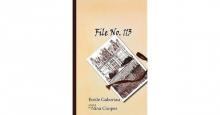 Le dossier no. 113. English
Le dossier no. 113. English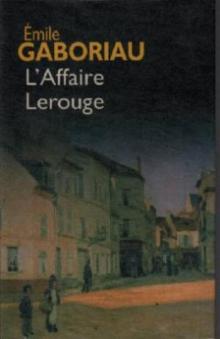 L'affaire Lerouge. English
L'affaire Lerouge. English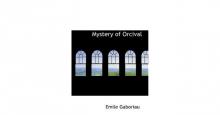 Le crime d'Orcival. English
Le crime d'Orcival. English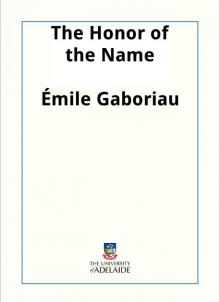 The Honor of the Name
The Honor of the Name The Count's Millions
The Count's Millions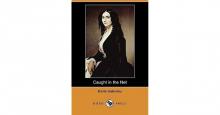 Caught in the Net
Caught in the Net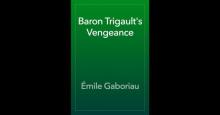 Baron Trigault's Vengeance
Baron Trigault's Vengeance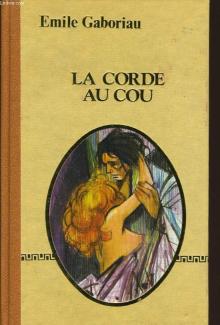 La clique dorée. English
La clique dorée. English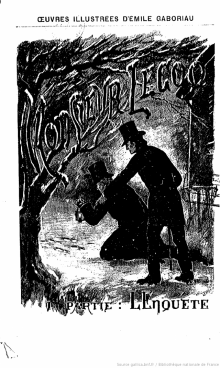 Monsieur Lecoq, v. 1
Monsieur Lecoq, v. 1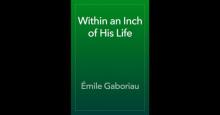 Within an Inch of His Life
Within an Inch of His Life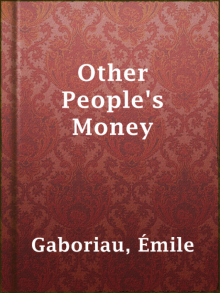 Other People's Money
Other People's Money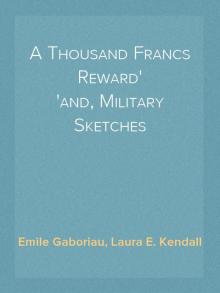 A Thousand Francs Reward; and, Military Sketches
A Thousand Francs Reward; and, Military Sketches